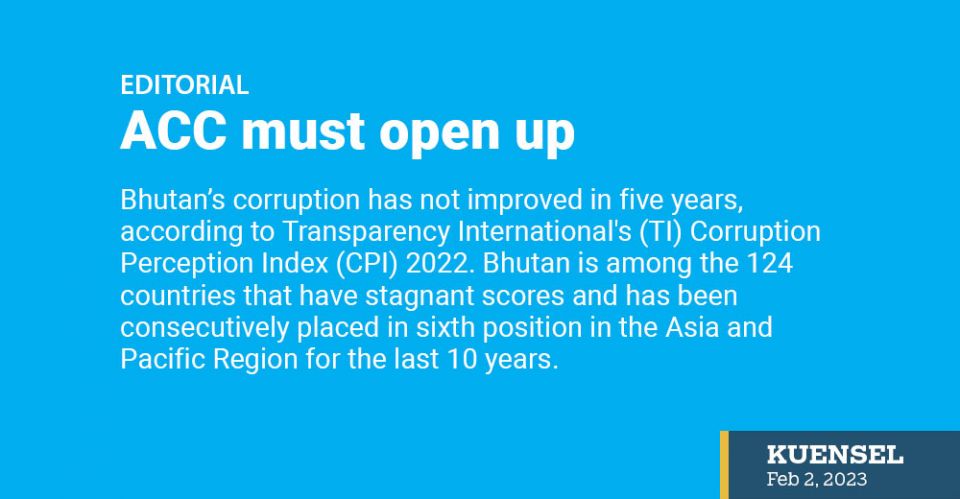
Bhutan’s corruption has not improved in five years, according to Transparency International’s (TI) Corruption Perception Index (CPI) 2022.
Bhutan is among the 124 countries that have stagnant scores and has been consecutively placed in sixth position in the Asia and Pacific Region for the last 10 years.
What does it mean? There is corruption and we aren’t doing enough to address the issue.
Anti-Corruption Commission (ACC) has said that Bhutan’s consistent performance, in the last 10 years, indicates that the country is doing moderately well in making progress toward sustainable development.
A sustainable development? In addressing corruption issues?
When the Commission distances itself from the media, tackling corruption will remain a challenge. Perhaps “sustainable development” is how the Commission understands reality.
Perception is also very important. Ask any Bhutanese or government agency. Information blockage has happened very heavily recently.
“While Bhutan’s score has moderately improved over the last decade, Bhutan is now at the critical point where ‘statistically significant’ changes would be necessary to improve its score and rank in the TI’s CPI,” says the report.
How are the better-ranking nations different from Bhutan? Simply put, they are open to media which helps them address corruption issues by bringing them to the notice of the public—transparency, oversight, and accountability cannot be achieved without media.
A small country like Bhutan is finding it difficult to address corruption. For international visitors, this is something that they cannot comprehend. Why, they ask.
In Bhutan, corruption cases are on the rise and are difficult to treat. This is from Anti-Corruption Commission’s (ACC) annual report 2021-2022.
Fighting corruption is becoming even more challenging with the increasing complexity of corruption cases due to the advancements in technology.
While ACC calls for collective efforts to prevent and combat corruption through a culture of integrity, fostering ethical business in the private sector, and engaging civil society organisations (CSOs) and media, it is, at the same time, disengaging the media.
Something must really be brewing!
If the Commission feels that there is a need for rigorous advocacy, promoting ethical leadership, and expanding integrity in schools and training institutes, where is the media in this picture?
Give ACC the teeth to fight corruption. Give it the independence it direly needs. ACC is not able to fight cases because corruption begins with those powerful and influential. But it is very important that the Commission partners with the media in this fight.
Nothing can be achieved otherwise. It is only a healthy partnership between the media and ACC that can effectively address corruption issues in the country.





